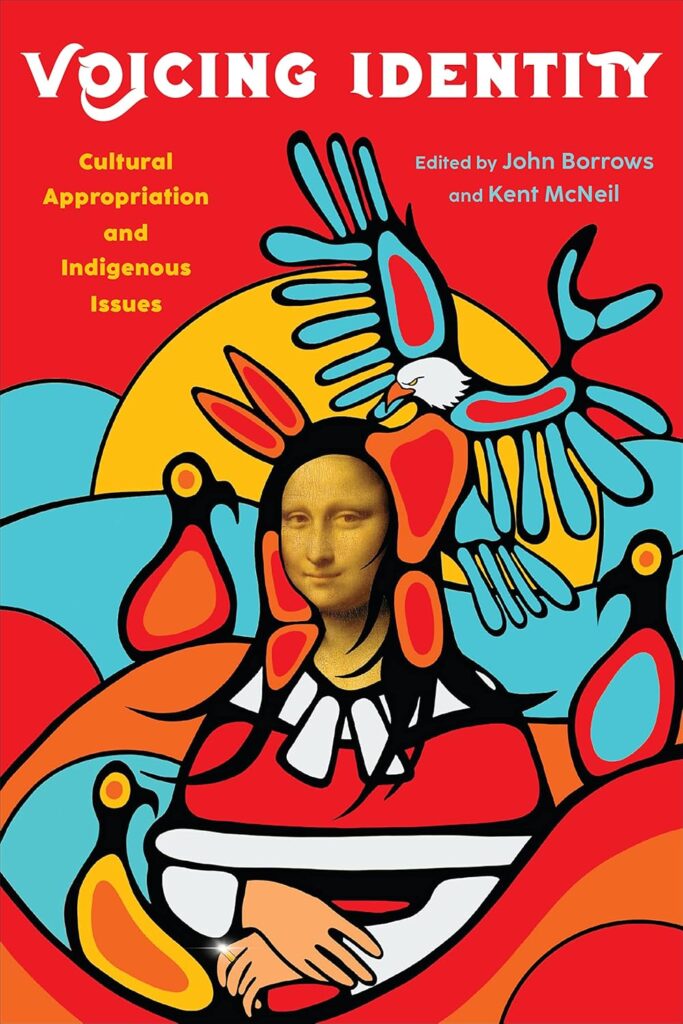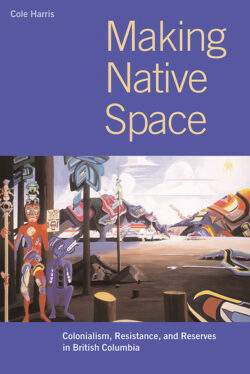Taking without permission
Voicing Identity: Cultural Appropriation and Indigenous Issues
by John Borrows and Kent McNeil (eds.)
Toronto: University of Toronto, 2022
$36.95 / 9781487544690
Reviewed by Richard Butler
*

Every group of people has a set of common stories. Some are origin stories. Others are historical and/or aspirational. Together they serve as a framework and possible point of reference for group members’ own personal stories.1
Group stories often gain first expression from living memory. Sometimes they are then recorded in writing and/or reproduced in ceremony and art—song, dance, costume, graven images, weaving, painting—as the means of transmission and an expression of “culture.”
Stories are always at risk of cultural appropriation. Voicing Identity: Cultural Appropriation and Indigenous Issues2 is about avoiding cultural appropriation in the re-telling of Indigenous Peoples’ stories—purporting to take something of cultural worth, tangible or often intangible, without permission, and make it in some way one’s own.

Professors John Borrows and Kent McNeil, the book’s editors, convened a small group of academics in an informal setting to discuss issues of cultural appropriation in their research and teaching. The workshop took place in Saskatoon in October 2019. According to one of the attendees, Robert Hamilton, the workshop was
first framed as being about cultural appropriation but morphed through the two days of conversation to include reflections on why we engage in this work at all. Our personal stories were understood as centrally relevant to how we chose to engage in this area; how we choose to use our voices, where we draw on voices of others and in what ways, and what animates this engagement were all understood as being informed by our experiences.
Afterwards, Borrows and McNeil invited contributions from the workshop participants and asked that they be personal and experiential, and not academic:
[T]he contributors took [those] instructions to heart. Some authors shared intimate experiences, feelings, thoughts. Many of them confessed [that] … the personal aspect of the exercise took them outside their comfort zones and made them feel vulnerable. …. We [Borrows and McNeil] are extremely grateful to all of them for taking these risks and being willing to share their personal experiences. We hope their openness will assist others in dealing with these challenging issues.
Voicing Identity thus contains a range of articles on topics of more or less common experience of its contributors, often presented from a deeply personal point of view. The articles show the contributors reconciling their own personal stories with the Indigenous stories they study. There is also much scholarship and guidance for other academics, as well as some remarkably unguarded moments—departures from the adage that “what happens in Vegas stays in Vegas.” It all makes for very compelling reading.

But why should anyone, other than scholars who research and write about Indigenous matters or the Indigenous people they deal with, be interested in Voicing Identity or care about cultural appropriation?
The short answer is that cultural appropriation, conscious or unconscious, is in its presumptions racializing and colonizing. Let me elaborate as to why.
Racializing in law, government, and industry thwarted Indigenous people’s best efforts to make a living in fishing, logging, farming, mining, and/or to support themselves in their traditional subsistence economy, all as described in John Sutton Lutz’s marvelous book, Makuk.3 Compared with all those instances of racism and racializing, cultural appropriation might seem a micro-aggression, akin to a mosquito whining in your bedroom at night. But cultural appropriation bites every time, because it is racializing.
Colonizing may be described as a series of takings by a dominating group from a less powerful group without permission. Its most obvious manifestation has been the taking of land, as described in Cole Harris’s Making Native Space.4 But colonialism is also, like the racism embedded in it, an attitude of mind and an expression of predominance. It therefore can be manifested in any taking whatsoever, without permission. Cultural appropriation is by that reckoning a further ongoing instance of colonization.
Here are a couple of possibly over-generalized examples, to make the distinction between simple expropriation or misappropriation on the one hand and cultural appropriation on the other:
- Statutory expropriation of Indigenous lands (with or without compensation) is not only a taking of the rights in land per se but also impairs the Indigenous social and spiritual connections with the land and everything in or on it. It thus becomes not merely an appropriation at law but also cultural appropriation.
- Taking any work of art and using it (e.g. on a tee-shirt) without permission or compensation is common law conversion of intellectual property. But where Indigenous art is reproduced on the tee-shirt without the name of the artist, doing so also becomes cultural appropriation because it fails to pay due respect to the traditions of the person and culture of which the art is a product.

In both examples, the harm is not only a matter of rights in property but also, in the context of Canada’s sorry dealings with Indigenous Peoples, a matter of social relations and a continuation of historical oppression. It is as if to say “you Indians have such a rich and attractive cultural background which you are not studying and which is at risk of disappearing. We settlers therefore have the right, if not a duty, to take it over and make more productive use of it.”
But surely all of that is in the past, or someone else’s concern.
Not so. In Canada today, we are all constantly faced with personal choices which may implicate us in cultural appropriation:
- whether to support old growth logging to save forestry jobs;
- whether to pick up a book of Haida poetry;
- whether to buy a cup and saucer decorated with a traditional Indigenous design;
- whether to deny there were crimes at the residential schools;
- what to make of all the drumming ceremonies on the nightly news;
- what about changing the names of streets or the words of the national anthem?
The best response to those choices is not a matter of instinctive political correctness, but a thought-through process involving the relationship between the subject matter and ourselves. If only it were as easy as checking out the bottom of the cup and saucer to see where they were made.
Voicing Identity shares the personal stories of that group of professors about how each of them has learned, and how we ourselves may learn, to respond to Indigenous stories in a culturally-respectful way. Doing so is a small first step toward promoting truth and reconciliation. It is a conscious turning away from the contest of narrative versus counter-narrative which seemingly besets us all. It lays the foundation for writing a common story: a shared understanding that there are different types of truths, and the mutual respectfulness needed to reach that understanding.
*
Richard Butler lives on the traditional territory of the lekwungen-speaking Peoples, a retired lawyer and sometime law professor, and more recently a writer on various Indigenous subjects. He is the author of Taking Reconciliation Personally, I Dare Say… Conversations with Indigeneity, and the new title What Is This? Who Am I?: Culturally Informed Appreciation of Coastal Peoples’ Artworks, published through A & R Publishing. [Editor’s Note: Richard Butler recently wrote the essay An Exercise in Futility and has reviewed books by Karen Duffek, Bill McLennan, Jordan Wilson (eds.), C.P. Champion and Tom Flanagan (eds.), and Aaron A.M. Ross for The British Columbia Review.]
*
The British Columbia Review
Interim Editors, 2023-25: Trevor Marc Hughes (non-fiction), Brett Josef Grubisic (fiction)
Publisher: Richard Mackie
Formerly The Ormsby Review, The British Columbia Review is an on-line book review and journal service for BC writers and readers. The Advisory Board now consists of Jean Barman, Wade Davis, Robin Fisher, Barry Gough, Hugh Johnston, Kathy Mezei, Patricia Roy, and Graeme Wynn. Provincial Government Patron (since September 2018): Creative BC. Honorary Patron: Yosef Wosk. Scholarly Patron: SFU Graduate Liberal Studies. The British Columbia Review was founded in 2016 by Richard Mackie and Alan Twigg.
“Only connect.” – E.M. Forster
- The Old Testament of the Bible is one example. ↩︎
- John Borrows and Kent McNeil (ed.), University of Toronto Press Toronto Buffalo London 2022. ↩︎
- John Sutton Lutz, Makuk: a New History of Aboriginal-White Relations, UBC Press Vancouver Toronto 2008. ↩︎
- Cole Harris, Making Native Space: Colonialism, Resistance and Reserves in British Columbia UBC Press, 2003. ↩︎
2 comments on “Taking without permission”